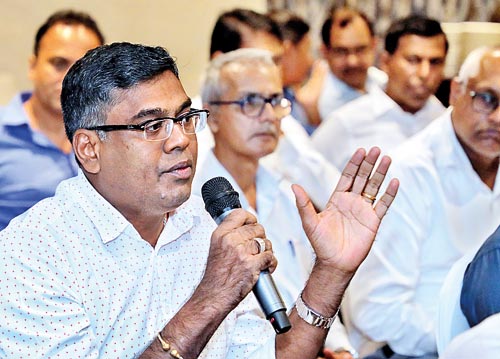Poor governance led to multiple layers of crises
The one thing that is running in the minds of all Sri Lankans is as to whether the country is actually progressing on the economy and getting out of the crisis. No doubt the sentiments are the same among all citizens when there is no transparency on what the government is dealing with the International Monetary Fund (IMF). Key reforms are yet to be implemented while the budget is to be presented in the parliament next month with an election coming up in 2024.

Asking a question from the audience. Pic by M.A. Pushpa Kumara
Two independent research institutes in Sri Lanka have been pushing for key reforms without which there is no way forward while the focus is to get the fundamentals of the economy right.
These were some of the issues discussed at the Sunday Times Business Club (STBC) organised event titled ‘Progress of Economic Growth’ at the Movenpick Hotel in Colombo on Tuesday. The two panelists were, Advocata Institute, CEO Dhananath Fernando and Verite Research, Lead Economist Raj Prabu Rajakulendran.
Mr. Fernando in his remarks highlighted that attempts are made to get some of the reforms in place complying with some of the IMF recommendations. “The diagnosis for Sri Lanka is that the fundamentals of economy are not right. Without getting the fundamentals right, there is no point trying to do anything. Sri Lanka can easily drift back to fuel queues and power cuts if the country doesn’t get its fundamentals right,” he said.
Sri Lanka’s debt to GDP ratio is 128 per cent and if everything goes well the projection is that the ratio will reduce to 95 per cent by 2032. “IMF is required, but there are massive economic reforms that Sri Lanka needs to fulfill beyond IMF’s conditions. Public’s concern is whether Sri Lanka will receive the second IMF tranche. It is just one milestone of a journey. IMF is required to get the debt restructuring going and the credibility of the process. Labour markets are not functioning, the capital markets and land markets are facing challenges,” stressed Mr. Fernando.
“There is some progress in the debt restructuring process but the real definition of a country’s recovery is ‘not going for another debt restructuring programme’. If we do so, this does not seem as a progress. Without the reforms we won’t be able to repay our creditors even after the debt restructuring is done,” he added.
Sri Lanka has to integrate with the global trade on the tariff structure. There are different tariff structures for various imported goods and there is room created for corruption to take place. There is some progress overall, but sadly the real deal is not sealed, noted Mr. Fernando.
Mr. Rajakulendran pointed out that Sri Lanka needs to focus whether the debt restructuring is a sustainable one. “It is only when you have the market access, where the country has the ability to borrow that indicates the debt is sustainable. 59 per cent of the countries that got into debt restructuring after a crisis had to do it more than once. Globally there have been 175 instances in 97 countries. One common aspect among all these countries is that they all rank very poor on governance.”
As per World Banks’ governance indicator analysis, Sri Lanka is among the poor governance indicators. The problem is that will Sri Lanka repeat what other countries have done? Is Sri Lanka able to bear the costs? Sri Lanka’s crisis has multiple layers to it. On top there is the exchange rate and inflation spiraling out due to the liquidity crisis. Then there is the solvency crisis, fiscal management crisis and governance crisis.
He mentioned that the country is now addressing on the surface level, suspending its debt repayments, getting immediate financing and trying to solve the liquidity to manage the next few months. The bleeding has stopped but the wound is still there. The wound will bleed again in a couple of months. This is what Sri Lanka has been doing in the past. Addressing governance is a key issue where looking at debt restructuring without looking at governance is not feasible.
Mr. Rajakulendran stated that Verite notices the lack of transparency on progress in the IMF programme. “The IMF programme is not a commitment to the IMF, but a commitment to the people of Sri Lanka to get out of the crisis. You have to be very transparent to the people of Sri Lanka on what you are doing and how you are progressing on a set plan. By the end of September 2023, 21 per cent of the programme is unknown. Sri Lanka is set to meet 10 commitments in the IMF programme that requires the government to be more transparent, publish tax holidays, cash flows, and procurement contracts. IMF has also clearly underlined to make it clear on how tax policies in general are designed.”
The IMF has implemented two governance diagnostics for Sri Lanka, the only country in the world to get two governance diagnostics. Also Sri Lanka is the first country in Asia to have an IMF governance diagnostic. Both of the diagnostics have great synergy. “One good thing emerging out of the crisis is that there is consensus on governance corruption being the root cause of the crisis, it’s not an economic crisis,” noted Mr. Rajakulendran. Movenpick is the host hotel of the STBC while NDB and Hemas are sponsors of the STBC events.
Hitad.lk has you covered with quality used or brand new cars for sale that are budget friendly yet reliable! Now is the time to sell your old ride for something more attractive to today's modern automotive market demands. Browse through our selection of affordable options now on Hitad.lk before deciding on what will work best for you!


